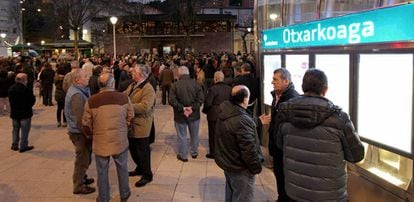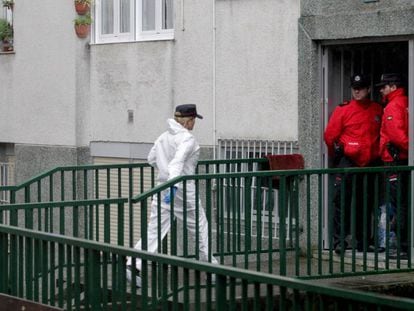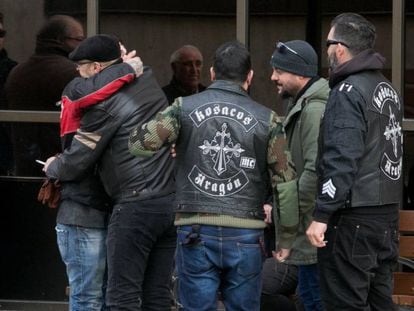Concerns rise in Bilbao as city hit by wave of juvenile violence
Alarm bells are going off after the arrest of five teenagers for three murders in the Basque city


There was pain, concern, indignation, fear and a sense of unity on Tuesday at the parish church of Saint Justo and Pastor in Otxarkoaga, the neighborhood in the Basque city of Bilbao where a senior couple was brutally murdered by juvenile delinquents.
It was very likely the same mix of feelings that many Bilbao residents have been experiencing on an everyday basis, due to a recent spate of violent acts by underage individuals who have organized into gangs. These groups of young criminals have sprung up under the skin of a city that is, paradoxically, enjoying greater prosperity and social cohesion than it had for decades.
An aggressive teenager is a teenager who has suffered aggression, and who is speaking to us through his actions
Enrique Saracho, psychiatrist
Two 14-year-olds and one 16-year-old, all residents of Otxarkoaga, have been arrested in connection with the murder of two 87-year-olds inside their home, presumably as part of a burglary attempt. Earlier, two other youths had been arrested for their involvement in the death of a former soccer player named Ibon Urrengoetxea, whom they kicked in the head while trying to mug him. One of the suspects is just 13 years old.
These are the two most high-profile cases, though not the only ones, to take place within the space of a month in a city that became a global household name when a Guggenheim museum opened here in 1997.
On December 28, five days after the soccer player’s killing, there was another violent episode. Two youths waiting for the subway at the Abando station were accosted by a group of young men. The victims were mugged and badly beaten, and one of them has lost an eye.
And two days after that, a 14-year-old girl reported being raped by four boys in Barakaldo, a city that is part of the Greater Bilbao metropolitan area.
Although authorities insist that there are no organized criminal gangs in Bilbao, names of groups such as “The Ghetto Family” and “Viseras Negras” (Black caps) have been linked to the perpetrators of these crimes.
But it was the brutal murder of the 87-year-old couple that really sent alarm bells ringing in a vibrant, multicultural city with a regular crime rate that is well below average and remarkable social cohesion.
The activity of the members plays a fundamental role in earning respect and prestige within the group
Vizcaya prosecutor’s report
It is likely that nobody thought that the steady stream of reports filed since 2014 by prosecutors in Vizcaya province would lead to this. Many youths, most of them from broken families, were getting caught up in a spiral of violence – right in front of the Basque institutions. “This represents a social failure,” admits Bilbao Mayor Juan María Aburto.
“It bears stressing that this trend is taking place among 12-year-olds,” said a 2014 report by the Vizcaya Prosecutor’s Office. Subsequent reports continued to underscore the problem of gang psychology. “The activity of the members plays a fundamental role in earning respect and prestige within the group, and being sent to a reform center sees them climb a rung on the ladder.”
These lines now sound like a prophecy.
There are close to 850 minors who are wards of provincial authorities in Vizcaya, with ages ranging from newborns to those who are about to come of age. Basque social services centers work on an “open regime” basis, with various restrictions imposed on juveniles who are otherwise free to come and go. There is only one closed detention center in the entire Basque Country, and that is in Zumárraga, in the province of Guipúzcoa. This is where the two suspects of stabbing and clubbing the senior couple to death are being held.
Bilbao has been enjoying greater prosperity and social cohesion than it had for decades
The psychiatrist who works with wards of the state in Álava province, Enrique Saracho, said on Radio Vitoria that an aggressive teenager is “a teenager who has suffered aggression, and who is speaking to us through his actions.”
The Basque police force has deployed additional patrols in Bilbao, day and night. And residents of Otxarkoaga, a neighborhood that grew out of a shantytown in the 1960s, are asking for more educational services.
“A group of us, payos [non-gypsies] and gitanos [gypsies] alike, got together on Monday and reached an agreement,” said a member of a neighborhood association on Monday. This collective is asking for more education in order to break the circle of petty theft that could end up in more murders.
English version by Susana Urra.












































